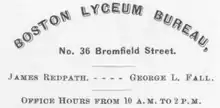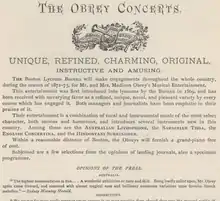Boston Lyceum Bureau
The Boston Lyceum Bureau (est.1868) in Boston, Massachusetts, was a project of James Redpath and George L. Fall. Its office stood at no.36 Bromfield Street. "Through its agency, many ... lecturers and authors of celebrity have been introduced to American audiences,"[1][2] including Frederick Douglass, Mark Twain, and George MacDonald.

The Boston Lyceum Bureau, Bromfield St., Boston, 1872
The partnership dissolved around 1874. Redpath continued briefly with the "Redpath Lyceum Bureau" which featured many of the same lecturers and performers as before. Eventually, other proprietors took over and the "Boston Lyceum Bureau" and the "Redpath Lyceum Bureau" expanded vigorously into the 20th century, with branches throughout the United States. [3][4]
Lecturers/Performers
- Susan B. Anthony[5]
- Henry Ward Beecher[6]
- Josh Billings[7]
- Emma Hardinge Britten[8]
- Moses T. Brown[8]
- Isabella Dallas-Glynn[8]
- Frederick Douglass[5]
- Adrian J. Ebell
- Fanny R. Edmunds[8]
- Ralph Waldo Emerson[9]
- Thomas Fitch[7]
- Edward Everett Hale
- B. Waterhouse Hawkins[8]
- John Hay
- Isaac I. Hayes[8]
- Thomas Wentworth Higginson[8]
- Lottie Hough[8]
- Julia Ward Howe[9]
- The Hyers Sisters
- Mary A. Livermore[8]
- David Ross Locke[7]
- Sam Lucas
- George MacDonald[7]
- Mendelssohn Quintette Club[8]
- Rev. W.H.H. Murray
- Mr. & Mrs. Madison Obrey[7]
- Oliver Optic
- Wendell Phillips[6]
- Kate Reignolds[8]
- Erminia Rudersdorff[7]
- Matthew Hale Smith[8]
- Elizabeth Cady Stanton[10]
- Charles Sumner[5]
- Virginia F. Townsend[8]
- Mark Twain[6]
- Edwin Percy Whipple[8]
See also
References

1873 advertisement for Mr. & Mrs. Madison Obrey, musicians: "Their entertainment ... introduces several instruments new in this country. Among these are the Australian lithophone, the Sardinian tibia, the English concertina, and the Hindostani surringhee."
- Elias Nason. A gazetteer of the state of Massachusetts. Boston: B.B. Russell, 1874
- Boston directory. 1874
- "Redpath Chautauqua Collection - Special Collections & University Archives - the University of Iowa Libraries".
- Boston register and business directory. 1921
- John R. McKivigan. "James Redpath" in: Encyclopedia of antislavery and abolition. Greenwood Publishing Group, 2007
- James C. McNutt. Mark Twain and the American Indian: Earthly Realism and Heavenly Idealism. American Indian Quarterly, Vol. 4, No. 3 (Aug., 1978)
- American Broadsides and Ephemera, Series 1
- The Nation. Oct. 12, 1871
- John P. Koontz. "James Redpath" in: Writers of the American Renaissance: an A-to-Z guide. Greenwood Publishing Group, 2003; p.309
- Lori D. Ginzberg. Elizabeth Cady Stanton: An American Life, p. 143. Farrar, Straus, Giroux, 2009
Further reading
Wikimedia Commons has media related to Boston Lyceum Bureau.
- Pond. "The Lyceum." The Cosmopolitan. April 1896.
- James "Redpath and the pioneer bureau he founded." Lyceum Magazine. Aug. 1922.
This article is issued from Wikipedia. The text is licensed under Creative Commons - Attribution - Sharealike. Additional terms may apply for the media files.